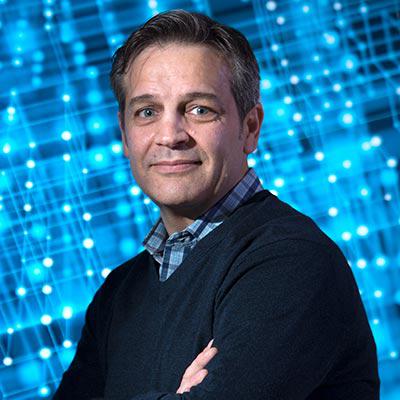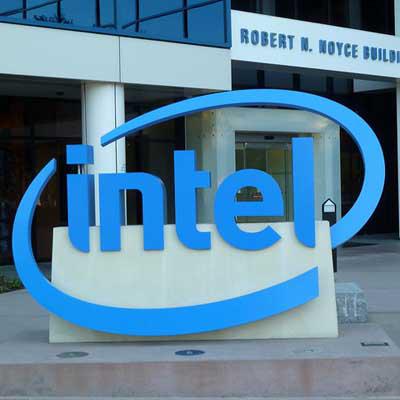CRN Exclusive: Intel's Michael Reed On The Company's Big Blockchain Bet And How Partners Could Benefit

Intel Making Big Bet On Blockchain
Intel turned heads in the cryptocurrency world when the company's patent application for specialty Bitcoin mining hardware was revealed in March.
While it was the biggest sign yet of the Santa Clara, Calif.-based company's interest in cryptocurrency, it is far from Intel's first step into the world of blockchain, the decentralized ledger technology that makes cryptocurrencies like Bitcoin possible. The company has partnered with Chinese firm Tencent for an Internet of Things blockchain solution and introduced an open-source blockchain framework called Hyperledger Sawtooth. Intel has also been working with the R3 consortium and Microsoft on enterprise blockchain deployments.
So where does Intel stand on cryptocurrency and blockchain? Michael Reed, director of Intel's Blockchain Program office, recently spoke with CRN about the company's ambitions in the fledgling space. He even gave more details about Intel's Bitcoin mining hardware accelerator patent application, which Reed worked on with the Intel Labs team behind the technology for implementation, though he couldn't divulge any details on Intel's future product road map.
"Blockchain is sort of a revolutionary new technology that offers enterprises in general an opportunity to change the way they work," Reed said. "The sort of magic in blockchain -- it started with Bitcoin back in 2008 – is that it can settle transactions without the use of an intermediary."
What follows is an edited excerpt of Reed's conversation with CRN.

Can you describe what your job is?
I manage the blockchain program in our Software and Solutions Group at Intel. Most of our software work comes out of a common group called Software and Solutions Group and, bureaucratically, it sits separately from business units that build our silicon. And what we're doing, we're working on cryptocurrency and blockchain technologies with a couple of goals in mind. One is to make sure that the key workloads in those areas work best on Intel architecture. And then another goal we have is to make sure we're providing developers in those areas the right tools such that they can bring solutions to market quickly.

How would you describe Intel's current interest in cryptocurrency and blockchain?
Blockchain is sort of a revolutionary new technology that offers enterprises in general an opportunity to change the way they work. The sort of magic in blockchain -- it started with Bitcoin back in 2008 – is that it can settle transactions without the use of an intermediary. So if you just think about the way you and I, consumers, make transactions every day, typically, when we exchange something of value with a third party, we have an intermediary between us and a third party who is basically helping manage the relationship.
Businesses, of course, have similar relationships. They exchange things of value between each other on a routine basis. Think stocks that are traded on the stock market. Think about supply chain as goods travel from raw materials up to finished goods. In those transactions, there is often a party in the middle that's actually collecting a fee and managing the relationship and the transaction between those companies.
So that's the interesting part about blockchain. This is a new capability that can take the middleman out of the transaction and ultimately create more value for companies. Intel's interest in this space is in identifying a new workload that comes into play and helping to make sure that workload runs best on Intel architecture. So as companies adopt our latest processors, either in servers or in [client computers] or in the cloud, they can run these new technologies, this new blockchain technology.

What was the impetus for Intel's patent for a Bitcoin mining hardware accelerator?
If we break it down to interesting workloads, Bitcoin mining is a massive compute problem as you may see. There are many computers focused on computing the next block that's going to go on to a blockchain in Bitcoin and Ethereum and eventually in enterprise blockchains as well. The compute that's involved in Bitcoin, in particular, comes off of a hashing algorithm that the patent references as [Secure Hash Algorithm 256 or SHA-256] – and Bitcoin notoriously consumes energy in order to perform this mining exercise – and we were looking at, 'Can we use some Intel innovation to reduce the amount of energy consumed in order to perform this hashing function?'

Is there a bigger role for the CPU in cryptocurrency mining?
There is absolutely a role for the CPU. The workload that we're talking about is a consensus workload. When we talk about Bitcoin mining, that consensus is [SHA-256] hashing that's done on ASICs [application-specific integrated circuits]. When we talk about Ethereum mining, they have their own hashing algorithm that typically runs on GPUs. And when we look at enterprise consensus, enterprise consensus is done in a variety of different ways, not with mining at all or hashing at all. What Intel has developed is a consensus algorithm called PoET, [which stands for] Proof of Elasped Time. If you look at the mining algorithms that Ethereum and Bitcoin have developed, they're generally referred to as Proof of Work and that a miner can demonstrate that they solve the puzzle and proved that they worked through it. Proof of Elapsed Time is a technique that enterprises could use to actually deliver a very similar capability to Bitcoin and Ethereum mining but do it with very little compute power. The way it works is, it launches a secure timer in our processors and sends a node on the network. [For the node] that gets through the timer the fastest is the node that puts the next block on the blockchain. In effect, instead of computers hashing like crazy like they do in Bitcoin and Ethereum, they have a lot of contributors backing off for a time and then coming back at the appropriate time and demonstrated that they timed out and they're ready to put another block on the blockchain.

Does Intel plan to commercialize this technology, like the hardware accelerator?
I can't talk about unannounced products at this time. We do work on a lot of future technologies, but I don't really have a product to announce in this regard at this point. The Proof of Elasped Time concept that I just conveyed to you, we delivered in open source last summer, so that is released.
Does Intel have any commercial products that address cryptocurrency or blockchain right now?
Our general-purpose processors can be used for mining. And most of the Bitcoin mining you see today, those are done on ASICs, and most of the Ethereum mining is done on GPUs. But you can use other processors for those, and there's a variety of cryptocurrencies beyond Ethereum and Bitcoin as well that use general-purpose processors for their consensus algorithm. And then, of course, in the enterprise space, we're working to make sure that the consensus mechanism that runs in enterprise -- which won't generally use hashing but will use some other techniques -- runs best on Intel architecture.

What's the bigger opportunity, cryptocurrency or blockchain?
Our focus is on the enterprise opportunity. We see the cryptocurrency innovation that came from Bitcoin and evolved to Ethereum as creating the framework for this new capability that can settle transactions without an intermediary. And we see opportunity to apply that to corporations and corporate workloads, where Intel processors are currently running many, many different enterprise workloads and basically apply that cryptocurrency innovation to these enterprise blockchains. And you'll see us working in places like Hyperledger, which is built out of the Linux Foundation that Intel was a founding member of. Hyperledger goes toward developing with the rest of the industry strong open-source solutions to help corporations get started [and developing appropriate requirements for those blockchain solutions for enterprises]. You'll also see us working in enterprise Ethereum, which is an effort by bank and technology companies like Intel -- again, we're a founder there -- it's an effort to take cryptocurrency technology that is Ethereum today in the public network and build an enterprise-deployable version of Ethereum, so that corporations can deploy their own Ethereum network. You'll see us in places like that where we're trying to help bring the industry together to help enterprises adopt this technology, this blockchain technology that underpins Bitcoin and Ethereum.

Have you been working with any other companies on blockchain projects?
Yes, a variety of companies. There's one company that I haven't mentioned yet. A company called R3. They're a banking consortium in the financial services industry. They have over 100 of the world's largest financial services companies as part of their consortium membership. And they're building a technology called R3 Corda, which is their own blockchain solution for the financial services industry. Intel invested in R3 back in March of 2017. We're working with them to build an enterprise blockchain that runs on a technology called Intel Software Guard Extensions [SGX]. This is a portion of our processors that helps improve blockchain privacy, security and scalability. That's one example of an intriguing corporate relationship that we have. Another one that you may be familiar with is -- the company is Microsoft -- they have a project called Azure Confident Computing, or ACC, and within that is a blockchain solution called … the Coco Framework for Microsoft. And like R3, this is an enterprise blockchain solution, and they're developing it, again, to run on this Intel Software Guard Extension for Intel SGX, and we're combining SGX with Coco Framework. Microsoft was able to demonstrate last August they could deliver 1,600 transactions per second for enterprise blockchain deployment, which, if you were to compare that to the throughput of public Bitcoin or public Ethereum today, those run between five and 15 transactions per second, so 1,600 transactions per second is quite a breakthrough, and it's something that a lot of companies are paying attention to.

For channel partners, is there an opportunity for them in the blockchain/cryptocurrency space?
There is absolutely, especially when you steer your attention towards the enterprise blockchain deployments. And I would just point out, there are several ways resellers and integrators can participate and provide solutions today. I'll just point out a few. One area is in open-source development, and today the largest systems integrators are members of Hyperledger and also the Enterprise Ethereum Alliance, and those are two strong bodies for enterprise blockchain solutions development. So that's a great place to put your attention if you're in a position of providing professional services consulting or even developing solutions on top of the open-source blockchain tools that are coming out of those bodies.
Another area they can look to is application development. This could apply to a public blockchain like Ethereum, which has a very rich coding environment built on a language they call Solidity. Solidity is also a tool that's used in enterprise blockchain deployments. And, in fact, there's an open-source project that Intel has contributed to Hyperledger called Hyperledger Sawtooth. It happens to run Solidity contracts in an Ethereum virtual machine built into it, so it can interpret Ethereum code. So that's an area to work on: developing blockchain applications at the smart contract level. Another [way] is delivering hardware and software solutions to customers. The hardware solutions are in the process of getting built right now and [Hewlett Packard Enterprise] announced back in Q4 a relationship with R3 where they're running R3 Corda on HPE server systems, so that bundle has been already integrated and validated between the two companies and is available for sale today. It can work in the cloud as well. Amazon and Microsoft Azure and other cloud service providers, like Oracle, are all building blockchain-as-a-service environments for developers and putting a variety of tools in place to help developers get started. That's another place where solutions can get built and delivered for customers.